LSO120: Feminist Theory and the 'Personal is Political' Slogan
VerifiedAdded on 2022/10/07
|11
|2476
|11
Essay
AI Summary
This essay delves into the core tenets of feminist theory, with a specific focus on the radical feminist movement and its defining slogan, "personal is political." The paper begins by establishing the historical context of radical feminism, contrasting it with liberal feminism and highlighting the diverse experiences of women across various social strata. It then provides a detailed explanation of the slogan, tracing its origins and its relationship to radical feminist ideology. The essay subsequently examines the practical application of this slogan in contemporary social issues, using the work of French Muslim feminist Fadela Amara as a case study. Amara's activism, particularly her stance on the hijab ban and her advocacy for the rights of Muslim women in France, serves to illustrate the ongoing relevance of the "personal is political" approach. The analysis further explores the research methodology employed, which is qualitative and deductive, and concludes by reiterating the enduring significance of radical feminist principles in challenging patriarchal structures and advocating for women's autonomy. The essay draws on a range of scholarly sources to support its arguments.

Running head: FEMINIST THEORY
FEMINIST THEORY
Name of the Student
Name of the University
Author Note
FEMINIST THEORY
Name of the Student
Name of the University
Author Note
Paraphrase This Document
Need a fresh take? Get an instant paraphrase of this document with our AI Paraphraser
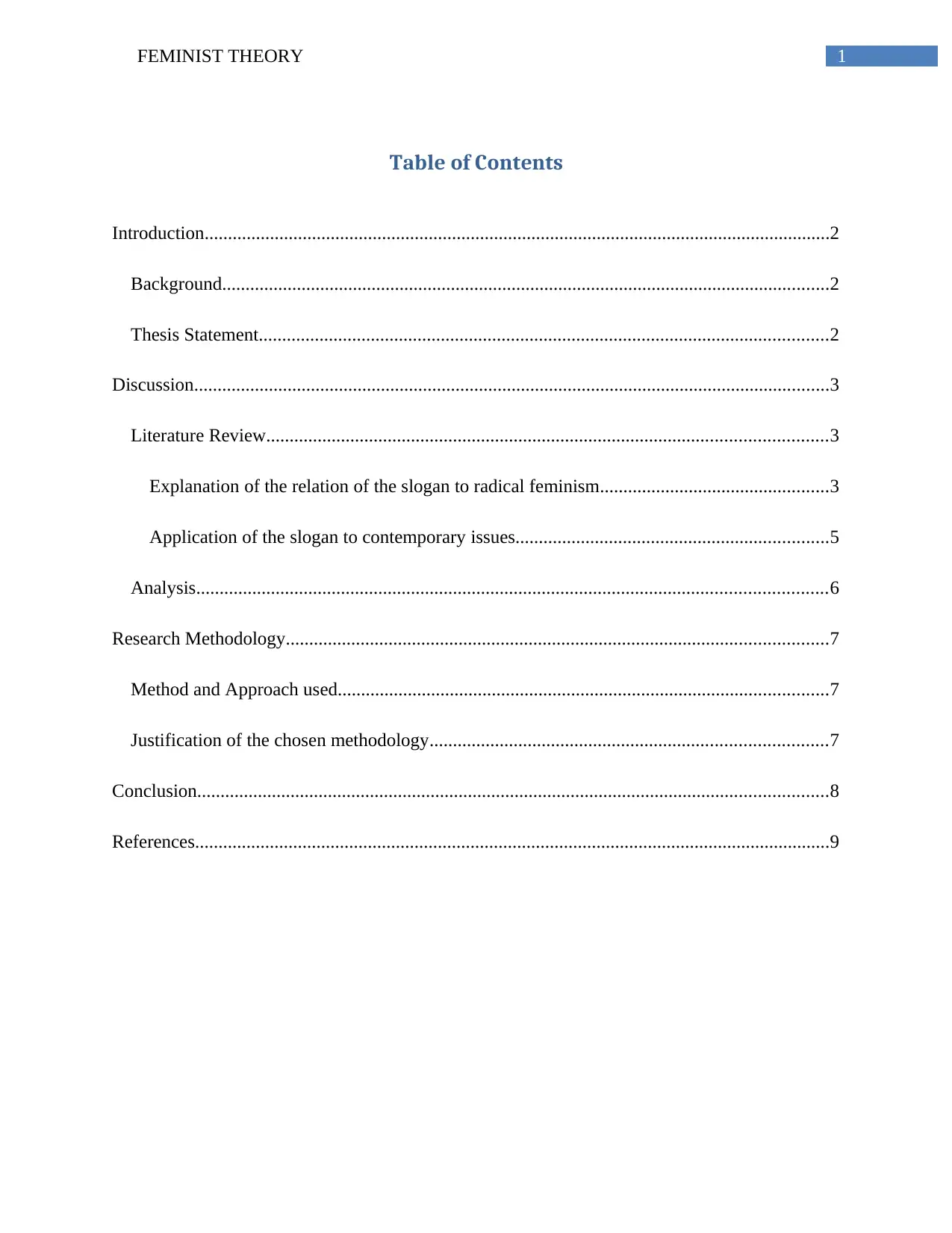
1FEMINIST THEORY
Table of Contents
Introduction......................................................................................................................................2
Background..................................................................................................................................2
Thesis Statement..........................................................................................................................2
Discussion........................................................................................................................................3
Literature Review........................................................................................................................3
Explanation of the relation of the slogan to radical feminism.................................................3
Application of the slogan to contemporary issues...................................................................5
Analysis.......................................................................................................................................6
Research Methodology....................................................................................................................7
Method and Approach used.........................................................................................................7
Justification of the chosen methodology.....................................................................................7
Conclusion.......................................................................................................................................8
References........................................................................................................................................9
Table of Contents
Introduction......................................................................................................................................2
Background..................................................................................................................................2
Thesis Statement..........................................................................................................................2
Discussion........................................................................................................................................3
Literature Review........................................................................................................................3
Explanation of the relation of the slogan to radical feminism.................................................3
Application of the slogan to contemporary issues...................................................................5
Analysis.......................................................................................................................................6
Research Methodology....................................................................................................................7
Method and Approach used.........................................................................................................7
Justification of the chosen methodology.....................................................................................7
Conclusion.......................................................................................................................................8
References........................................................................................................................................9
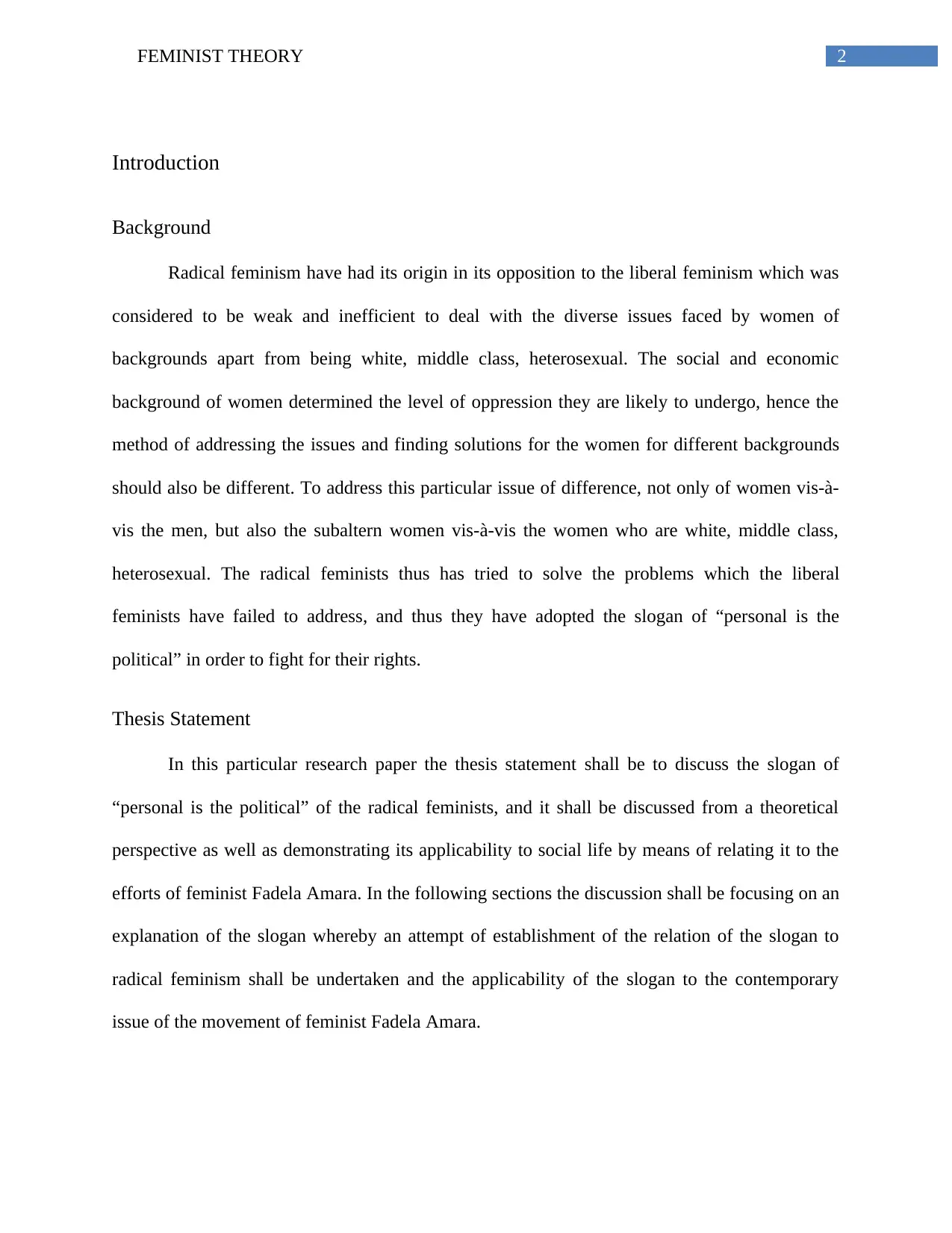
2FEMINIST THEORY
Introduction
Background
Radical feminism have had its origin in its opposition to the liberal feminism which was
considered to be weak and inefficient to deal with the diverse issues faced by women of
backgrounds apart from being white, middle class, heterosexual. The social and economic
background of women determined the level of oppression they are likely to undergo, hence the
method of addressing the issues and finding solutions for the women for different backgrounds
should also be different. To address this particular issue of difference, not only of women vis-à-
vis the men, but also the subaltern women vis-à-vis the women who are white, middle class,
heterosexual. The radical feminists thus has tried to solve the problems which the liberal
feminists have failed to address, and thus they have adopted the slogan of “personal is the
political” in order to fight for their rights.
Thesis Statement
In this particular research paper the thesis statement shall be to discuss the slogan of
“personal is the political” of the radical feminists, and it shall be discussed from a theoretical
perspective as well as demonstrating its applicability to social life by means of relating it to the
efforts of feminist Fadela Amara. In the following sections the discussion shall be focusing on an
explanation of the slogan whereby an attempt of establishment of the relation of the slogan to
radical feminism shall be undertaken and the applicability of the slogan to the contemporary
issue of the movement of feminist Fadela Amara.
Introduction
Background
Radical feminism have had its origin in its opposition to the liberal feminism which was
considered to be weak and inefficient to deal with the diverse issues faced by women of
backgrounds apart from being white, middle class, heterosexual. The social and economic
background of women determined the level of oppression they are likely to undergo, hence the
method of addressing the issues and finding solutions for the women for different backgrounds
should also be different. To address this particular issue of difference, not only of women vis-à-
vis the men, but also the subaltern women vis-à-vis the women who are white, middle class,
heterosexual. The radical feminists thus has tried to solve the problems which the liberal
feminists have failed to address, and thus they have adopted the slogan of “personal is the
political” in order to fight for their rights.
Thesis Statement
In this particular research paper the thesis statement shall be to discuss the slogan of
“personal is the political” of the radical feminists, and it shall be discussed from a theoretical
perspective as well as demonstrating its applicability to social life by means of relating it to the
efforts of feminist Fadela Amara. In the following sections the discussion shall be focusing on an
explanation of the slogan whereby an attempt of establishment of the relation of the slogan to
radical feminism shall be undertaken and the applicability of the slogan to the contemporary
issue of the movement of feminist Fadela Amara.
⊘ This is a preview!⊘
Do you want full access?
Subscribe today to unlock all pages.

Trusted by 1+ million students worldwide
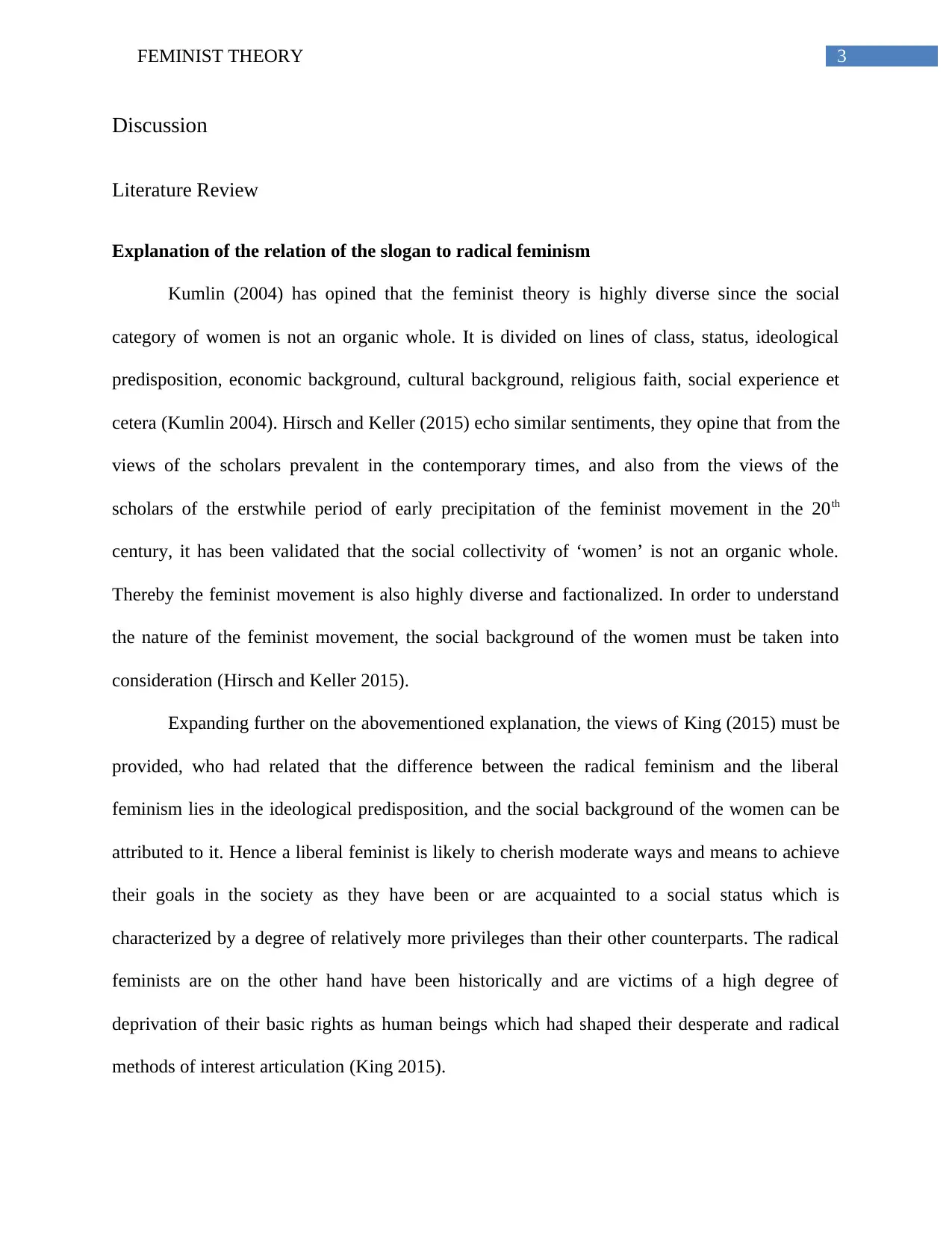
3FEMINIST THEORY
Discussion
Literature Review
Explanation of the relation of the slogan to radical feminism
Kumlin (2004) has opined that the feminist theory is highly diverse since the social
category of women is not an organic whole. It is divided on lines of class, status, ideological
predisposition, economic background, cultural background, religious faith, social experience et
cetera (Kumlin 2004). Hirsch and Keller (2015) echo similar sentiments, they opine that from the
views of the scholars prevalent in the contemporary times, and also from the views of the
scholars of the erstwhile period of early precipitation of the feminist movement in the 20th
century, it has been validated that the social collectivity of ‘women’ is not an organic whole.
Thereby the feminist movement is also highly diverse and factionalized. In order to understand
the nature of the feminist movement, the social background of the women must be taken into
consideration (Hirsch and Keller 2015).
Expanding further on the abovementioned explanation, the views of King (2015) must be
provided, who had related that the difference between the radical feminism and the liberal
feminism lies in the ideological predisposition, and the social background of the women can be
attributed to it. Hence a liberal feminist is likely to cherish moderate ways and means to achieve
their goals in the society as they have been or are acquainted to a social status which is
characterized by a degree of relatively more privileges than their other counterparts. The radical
feminists are on the other hand have been historically and are victims of a high degree of
deprivation of their basic rights as human beings which had shaped their desperate and radical
methods of interest articulation (King 2015).
Discussion
Literature Review
Explanation of the relation of the slogan to radical feminism
Kumlin (2004) has opined that the feminist theory is highly diverse since the social
category of women is not an organic whole. It is divided on lines of class, status, ideological
predisposition, economic background, cultural background, religious faith, social experience et
cetera (Kumlin 2004). Hirsch and Keller (2015) echo similar sentiments, they opine that from the
views of the scholars prevalent in the contemporary times, and also from the views of the
scholars of the erstwhile period of early precipitation of the feminist movement in the 20th
century, it has been validated that the social collectivity of ‘women’ is not an organic whole.
Thereby the feminist movement is also highly diverse and factionalized. In order to understand
the nature of the feminist movement, the social background of the women must be taken into
consideration (Hirsch and Keller 2015).
Expanding further on the abovementioned explanation, the views of King (2015) must be
provided, who had related that the difference between the radical feminism and the liberal
feminism lies in the ideological predisposition, and the social background of the women can be
attributed to it. Hence a liberal feminist is likely to cherish moderate ways and means to achieve
their goals in the society as they have been or are acquainted to a social status which is
characterized by a degree of relatively more privileges than their other counterparts. The radical
feminists are on the other hand have been historically and are victims of a high degree of
deprivation of their basic rights as human beings which had shaped their desperate and radical
methods of interest articulation (King 2015).
Paraphrase This Document
Need a fresh take? Get an instant paraphrase of this document with our AI Paraphraser
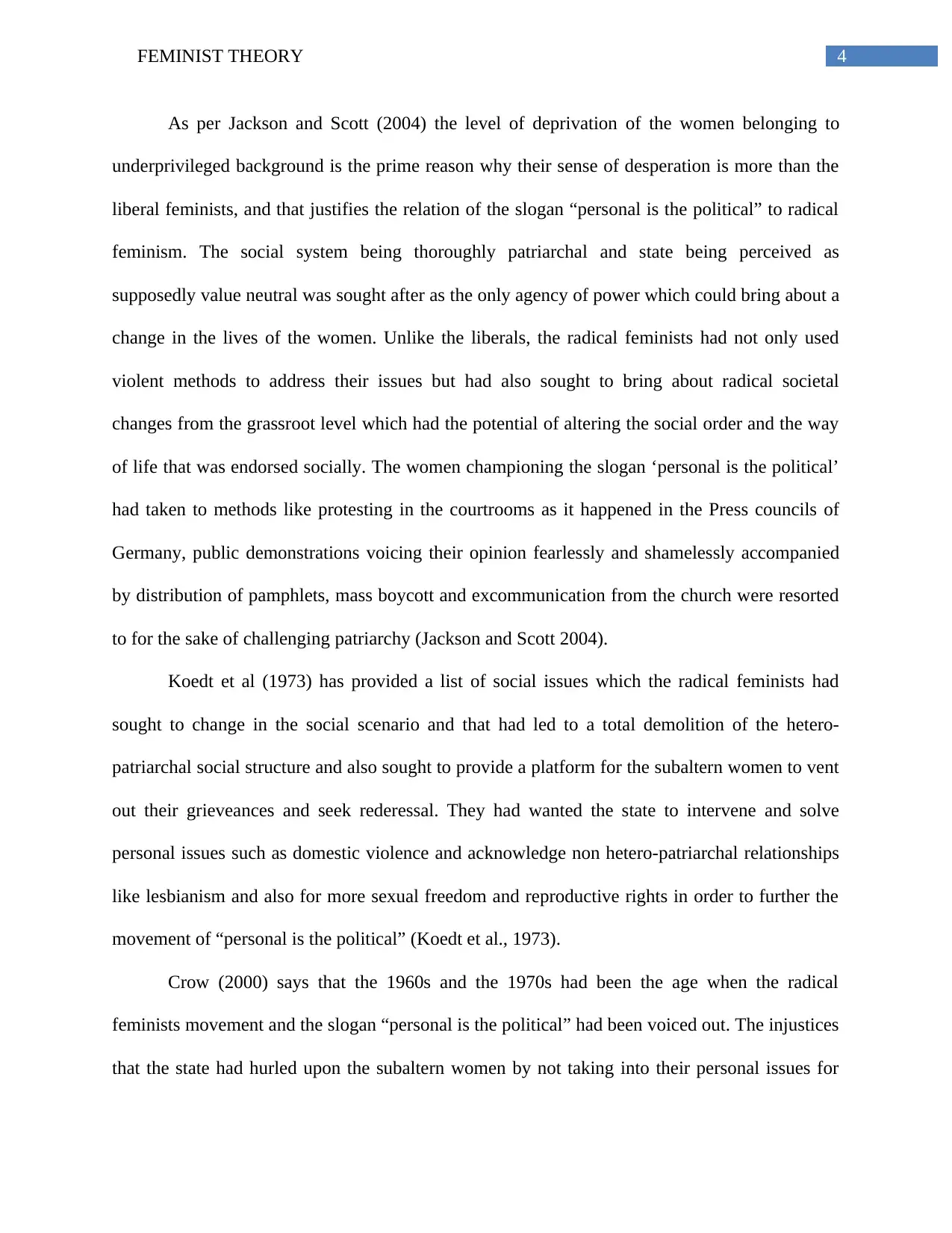
4FEMINIST THEORY
As per Jackson and Scott (2004) the level of deprivation of the women belonging to
underprivileged background is the prime reason why their sense of desperation is more than the
liberal feminists, and that justifies the relation of the slogan “personal is the political” to radical
feminism. The social system being thoroughly patriarchal and state being perceived as
supposedly value neutral was sought after as the only agency of power which could bring about a
change in the lives of the women. Unlike the liberals, the radical feminists had not only used
violent methods to address their issues but had also sought to bring about radical societal
changes from the grassroot level which had the potential of altering the social order and the way
of life that was endorsed socially. The women championing the slogan ‘personal is the political’
had taken to methods like protesting in the courtrooms as it happened in the Press councils of
Germany, public demonstrations voicing their opinion fearlessly and shamelessly accompanied
by distribution of pamphlets, mass boycott and excommunication from the church were resorted
to for the sake of challenging patriarchy (Jackson and Scott 2004).
Koedt et al (1973) has provided a list of social issues which the radical feminists had
sought to change in the social scenario and that had led to a total demolition of the hetero-
patriarchal social structure and also sought to provide a platform for the subaltern women to vent
out their grieveances and seek rederessal. They had wanted the state to intervene and solve
personal issues such as domestic violence and acknowledge non hetero-patriarchal relationships
like lesbianism and also for more sexual freedom and reproductive rights in order to further the
movement of “personal is the political” (Koedt et al., 1973).
Crow (2000) says that the 1960s and the 1970s had been the age when the radical
feminists movement and the slogan “personal is the political” had been voiced out. The injustices
that the state had hurled upon the subaltern women by not taking into their personal issues for
As per Jackson and Scott (2004) the level of deprivation of the women belonging to
underprivileged background is the prime reason why their sense of desperation is more than the
liberal feminists, and that justifies the relation of the slogan “personal is the political” to radical
feminism. The social system being thoroughly patriarchal and state being perceived as
supposedly value neutral was sought after as the only agency of power which could bring about a
change in the lives of the women. Unlike the liberals, the radical feminists had not only used
violent methods to address their issues but had also sought to bring about radical societal
changes from the grassroot level which had the potential of altering the social order and the way
of life that was endorsed socially. The women championing the slogan ‘personal is the political’
had taken to methods like protesting in the courtrooms as it happened in the Press councils of
Germany, public demonstrations voicing their opinion fearlessly and shamelessly accompanied
by distribution of pamphlets, mass boycott and excommunication from the church were resorted
to for the sake of challenging patriarchy (Jackson and Scott 2004).
Koedt et al (1973) has provided a list of social issues which the radical feminists had
sought to change in the social scenario and that had led to a total demolition of the hetero-
patriarchal social structure and also sought to provide a platform for the subaltern women to vent
out their grieveances and seek rederessal. They had wanted the state to intervene and solve
personal issues such as domestic violence and acknowledge non hetero-patriarchal relationships
like lesbianism and also for more sexual freedom and reproductive rights in order to further the
movement of “personal is the political” (Koedt et al., 1973).
Crow (2000) says that the 1960s and the 1970s had been the age when the radical
feminists movement and the slogan “personal is the political” had been voiced out. The injustices
that the state had hurled upon the subaltern women by not taking into their personal issues for
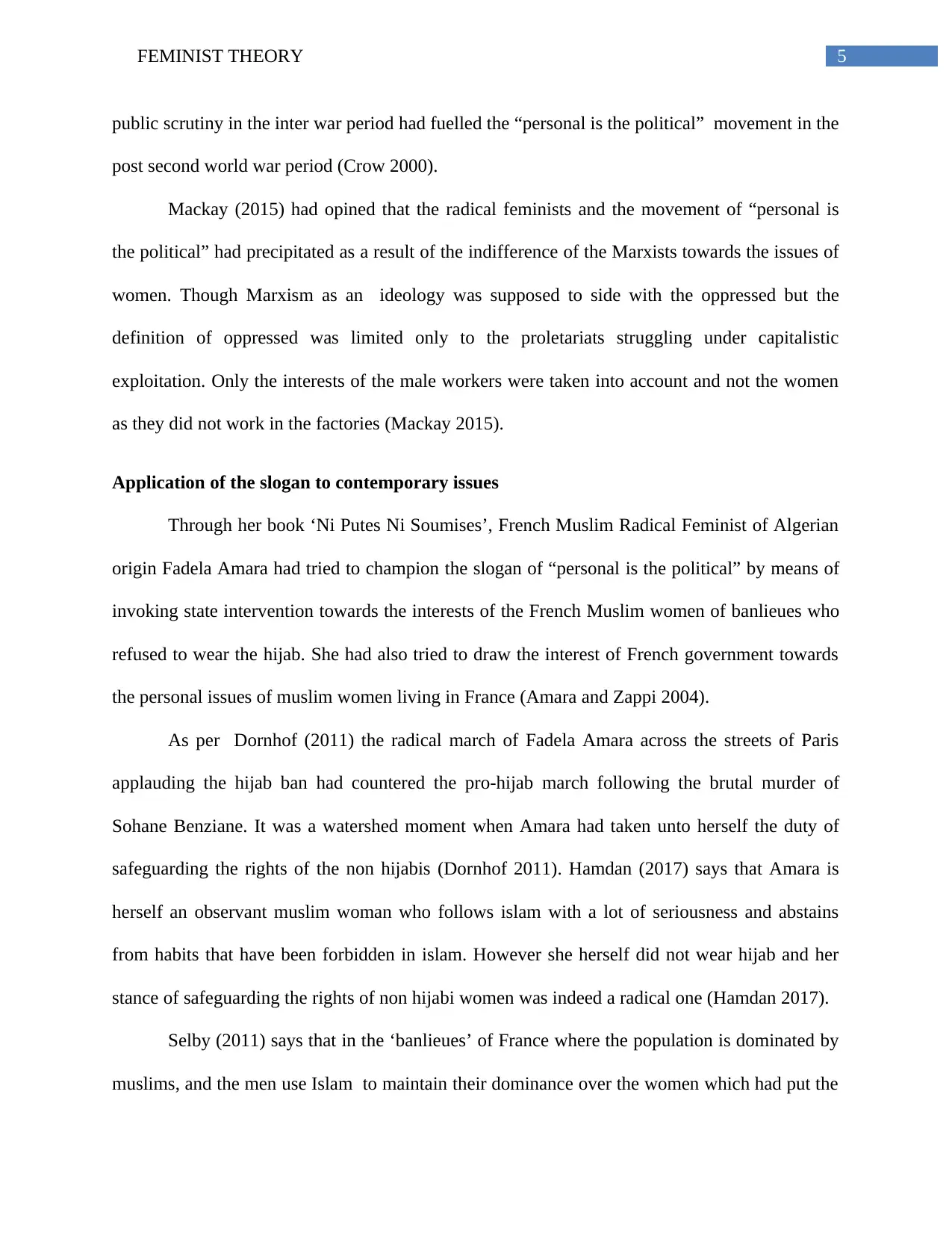
5FEMINIST THEORY
public scrutiny in the inter war period had fuelled the “personal is the political” movement in the
post second world war period (Crow 2000).
Mackay (2015) had opined that the radical feminists and the movement of “personal is
the political” had precipitated as a result of the indifference of the Marxists towards the issues of
women. Though Marxism as an ideology was supposed to side with the oppressed but the
definition of oppressed was limited only to the proletariats struggling under capitalistic
exploitation. Only the interests of the male workers were taken into account and not the women
as they did not work in the factories (Mackay 2015).
Application of the slogan to contemporary issues
Through her book ‘Ni Putes Ni Soumises’, French Muslim Radical Feminist of Algerian
origin Fadela Amara had tried to champion the slogan of “personal is the political” by means of
invoking state intervention towards the interests of the French Muslim women of banlieues who
refused to wear the hijab. She had also tried to draw the interest of French government towards
the personal issues of muslim women living in France (Amara and Zappi 2004).
As per Dornhof (2011) the radical march of Fadela Amara across the streets of Paris
applauding the hijab ban had countered the pro-hijab march following the brutal murder of
Sohane Benziane. It was a watershed moment when Amara had taken unto herself the duty of
safeguarding the rights of the non hijabis (Dornhof 2011). Hamdan (2017) says that Amara is
herself an observant muslim woman who follows islam with a lot of seriousness and abstains
from habits that have been forbidden in islam. However she herself did not wear hijab and her
stance of safeguarding the rights of non hijabi women was indeed a radical one (Hamdan 2017).
Selby (2011) says that in the ‘banlieues’ of France where the population is dominated by
muslims, and the men use Islam to maintain their dominance over the women which had put the
public scrutiny in the inter war period had fuelled the “personal is the political” movement in the
post second world war period (Crow 2000).
Mackay (2015) had opined that the radical feminists and the movement of “personal is
the political” had precipitated as a result of the indifference of the Marxists towards the issues of
women. Though Marxism as an ideology was supposed to side with the oppressed but the
definition of oppressed was limited only to the proletariats struggling under capitalistic
exploitation. Only the interests of the male workers were taken into account and not the women
as they did not work in the factories (Mackay 2015).
Application of the slogan to contemporary issues
Through her book ‘Ni Putes Ni Soumises’, French Muslim Radical Feminist of Algerian
origin Fadela Amara had tried to champion the slogan of “personal is the political” by means of
invoking state intervention towards the interests of the French Muslim women of banlieues who
refused to wear the hijab. She had also tried to draw the interest of French government towards
the personal issues of muslim women living in France (Amara and Zappi 2004).
As per Dornhof (2011) the radical march of Fadela Amara across the streets of Paris
applauding the hijab ban had countered the pro-hijab march following the brutal murder of
Sohane Benziane. It was a watershed moment when Amara had taken unto herself the duty of
safeguarding the rights of the non hijabis (Dornhof 2011). Hamdan (2017) says that Amara is
herself an observant muslim woman who follows islam with a lot of seriousness and abstains
from habits that have been forbidden in islam. However she herself did not wear hijab and her
stance of safeguarding the rights of non hijabi women was indeed a radical one (Hamdan 2017).
Selby (2011) says that in the ‘banlieues’ of France where the population is dominated by
muslims, and the men use Islam to maintain their dominance over the women which had put the
⊘ This is a preview!⊘
Do you want full access?
Subscribe today to unlock all pages.

Trusted by 1+ million students worldwide
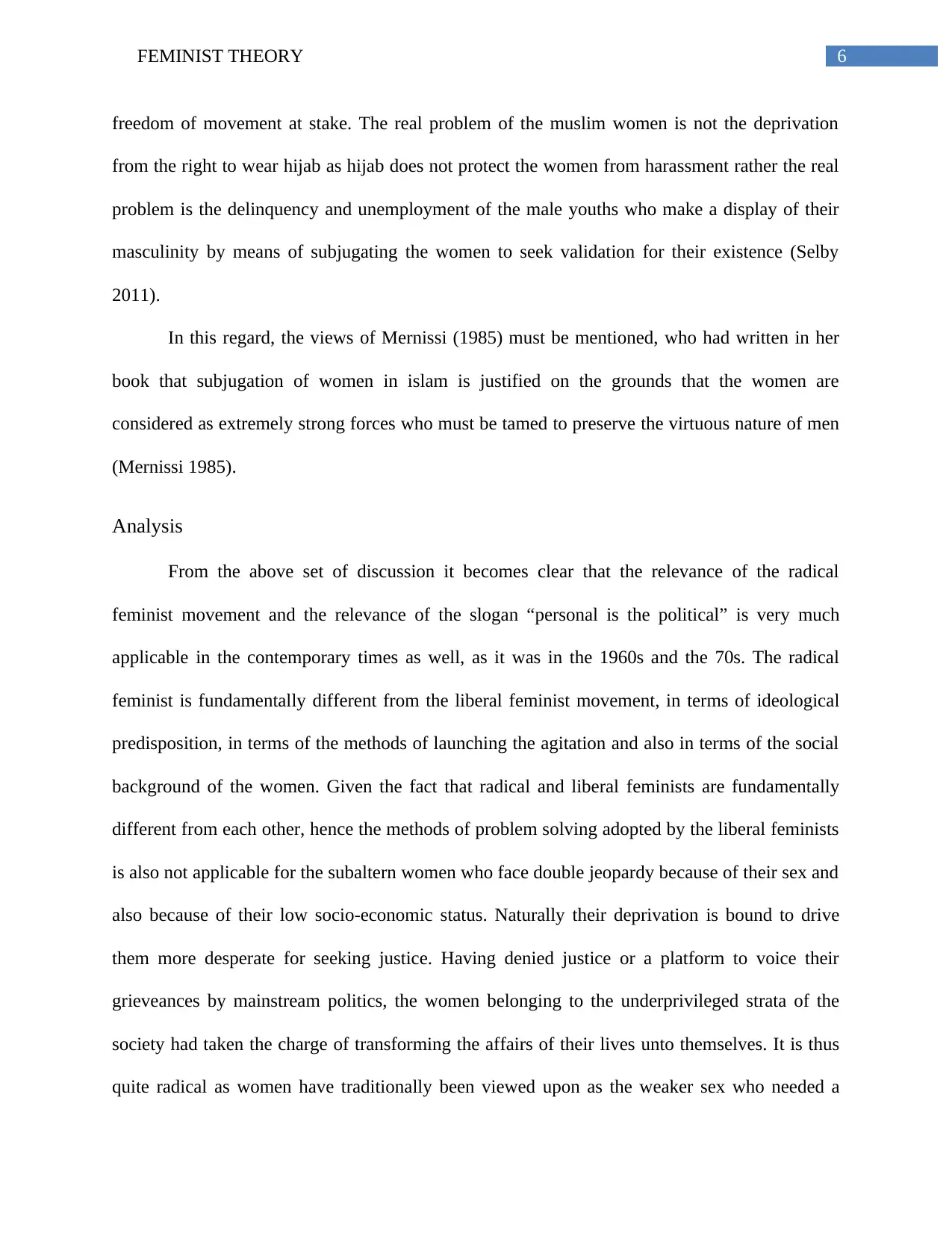
6FEMINIST THEORY
freedom of movement at stake. The real problem of the muslim women is not the deprivation
from the right to wear hijab as hijab does not protect the women from harassment rather the real
problem is the delinquency and unemployment of the male youths who make a display of their
masculinity by means of subjugating the women to seek validation for their existence (Selby
2011).
In this regard, the views of Mernissi (1985) must be mentioned, who had written in her
book that subjugation of women in islam is justified on the grounds that the women are
considered as extremely strong forces who must be tamed to preserve the virtuous nature of men
(Mernissi 1985).
Analysis
From the above set of discussion it becomes clear that the relevance of the radical
feminist movement and the relevance of the slogan “personal is the political” is very much
applicable in the contemporary times as well, as it was in the 1960s and the 70s. The radical
feminist is fundamentally different from the liberal feminist movement, in terms of ideological
predisposition, in terms of the methods of launching the agitation and also in terms of the social
background of the women. Given the fact that radical and liberal feminists are fundamentally
different from each other, hence the methods of problem solving adopted by the liberal feminists
is also not applicable for the subaltern women who face double jeopardy because of their sex and
also because of their low socio-economic status. Naturally their deprivation is bound to drive
them more desperate for seeking justice. Having denied justice or a platform to voice their
grieveances by mainstream politics, the women belonging to the underprivileged strata of the
society had taken the charge of transforming the affairs of their lives unto themselves. It is thus
quite radical as women have traditionally been viewed upon as the weaker sex who needed a
freedom of movement at stake. The real problem of the muslim women is not the deprivation
from the right to wear hijab as hijab does not protect the women from harassment rather the real
problem is the delinquency and unemployment of the male youths who make a display of their
masculinity by means of subjugating the women to seek validation for their existence (Selby
2011).
In this regard, the views of Mernissi (1985) must be mentioned, who had written in her
book that subjugation of women in islam is justified on the grounds that the women are
considered as extremely strong forces who must be tamed to preserve the virtuous nature of men
(Mernissi 1985).
Analysis
From the above set of discussion it becomes clear that the relevance of the radical
feminist movement and the relevance of the slogan “personal is the political” is very much
applicable in the contemporary times as well, as it was in the 1960s and the 70s. The radical
feminist is fundamentally different from the liberal feminist movement, in terms of ideological
predisposition, in terms of the methods of launching the agitation and also in terms of the social
background of the women. Given the fact that radical and liberal feminists are fundamentally
different from each other, hence the methods of problem solving adopted by the liberal feminists
is also not applicable for the subaltern women who face double jeopardy because of their sex and
also because of their low socio-economic status. Naturally their deprivation is bound to drive
them more desperate for seeking justice. Having denied justice or a platform to voice their
grieveances by mainstream politics, the women belonging to the underprivileged strata of the
society had taken the charge of transforming the affairs of their lives unto themselves. It is thus
quite radical as women have traditionally been viewed upon as the weaker sex who needed a
Paraphrase This Document
Need a fresh take? Get an instant paraphrase of this document with our AI Paraphraser
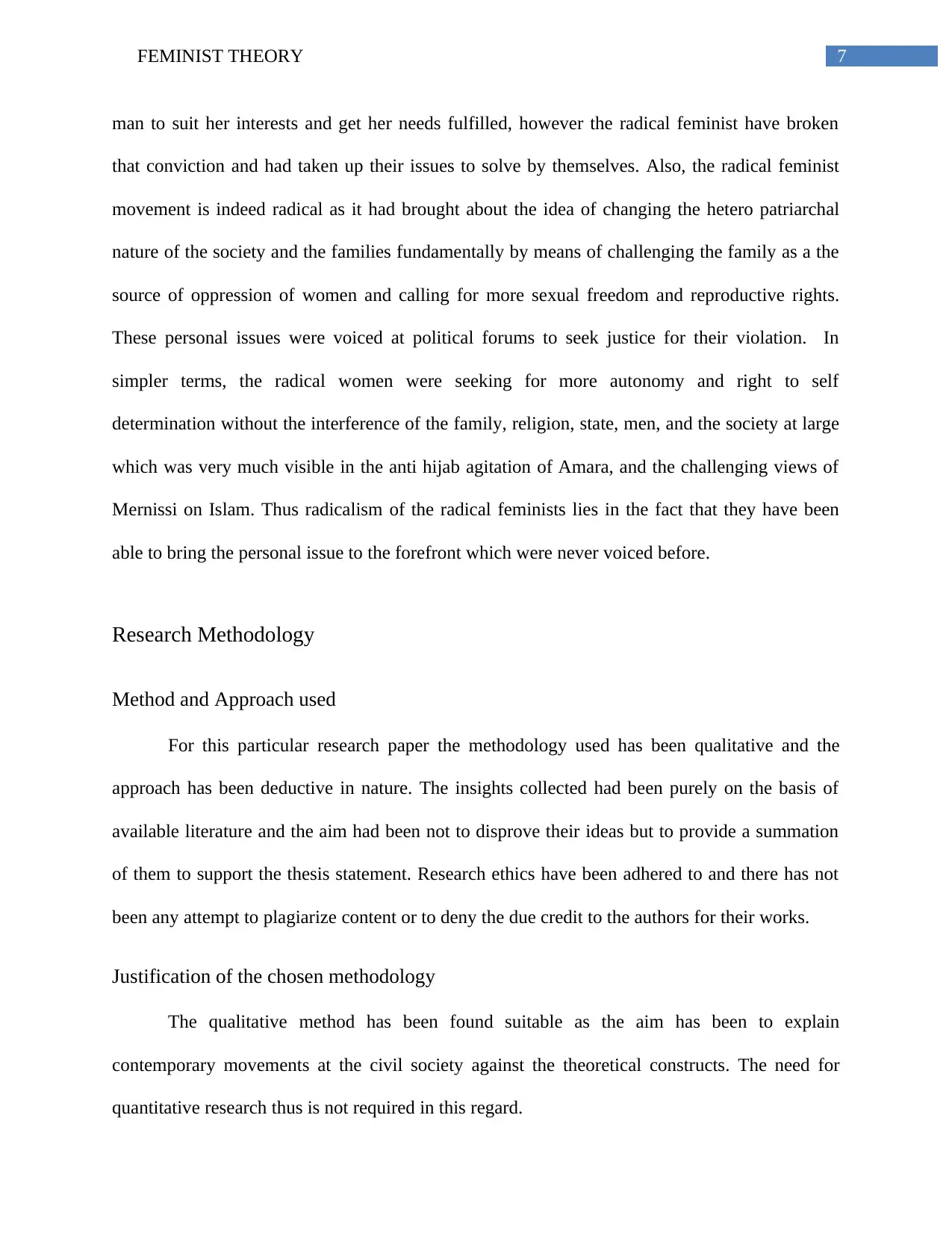
7FEMINIST THEORY
man to suit her interests and get her needs fulfilled, however the radical feminist have broken
that conviction and had taken up their issues to solve by themselves. Also, the radical feminist
movement is indeed radical as it had brought about the idea of changing the hetero patriarchal
nature of the society and the families fundamentally by means of challenging the family as a the
source of oppression of women and calling for more sexual freedom and reproductive rights.
These personal issues were voiced at political forums to seek justice for their violation. In
simpler terms, the radical women were seeking for more autonomy and right to self
determination without the interference of the family, religion, state, men, and the society at large
which was very much visible in the anti hijab agitation of Amara, and the challenging views of
Mernissi on Islam. Thus radicalism of the radical feminists lies in the fact that they have been
able to bring the personal issue to the forefront which were never voiced before.
Research Methodology
Method and Approach used
For this particular research paper the methodology used has been qualitative and the
approach has been deductive in nature. The insights collected had been purely on the basis of
available literature and the aim had been not to disprove their ideas but to provide a summation
of them to support the thesis statement. Research ethics have been adhered to and there has not
been any attempt to plagiarize content or to deny the due credit to the authors for their works.
Justification of the chosen methodology
The qualitative method has been found suitable as the aim has been to explain
contemporary movements at the civil society against the theoretical constructs. The need for
quantitative research thus is not required in this regard.
man to suit her interests and get her needs fulfilled, however the radical feminist have broken
that conviction and had taken up their issues to solve by themselves. Also, the radical feminist
movement is indeed radical as it had brought about the idea of changing the hetero patriarchal
nature of the society and the families fundamentally by means of challenging the family as a the
source of oppression of women and calling for more sexual freedom and reproductive rights.
These personal issues were voiced at political forums to seek justice for their violation. In
simpler terms, the radical women were seeking for more autonomy and right to self
determination without the interference of the family, religion, state, men, and the society at large
which was very much visible in the anti hijab agitation of Amara, and the challenging views of
Mernissi on Islam. Thus radicalism of the radical feminists lies in the fact that they have been
able to bring the personal issue to the forefront which were never voiced before.
Research Methodology
Method and Approach used
For this particular research paper the methodology used has been qualitative and the
approach has been deductive in nature. The insights collected had been purely on the basis of
available literature and the aim had been not to disprove their ideas but to provide a summation
of them to support the thesis statement. Research ethics have been adhered to and there has not
been any attempt to plagiarize content or to deny the due credit to the authors for their works.
Justification of the chosen methodology
The qualitative method has been found suitable as the aim has been to explain
contemporary movements at the civil society against the theoretical constructs. The need for
quantitative research thus is not required in this regard.
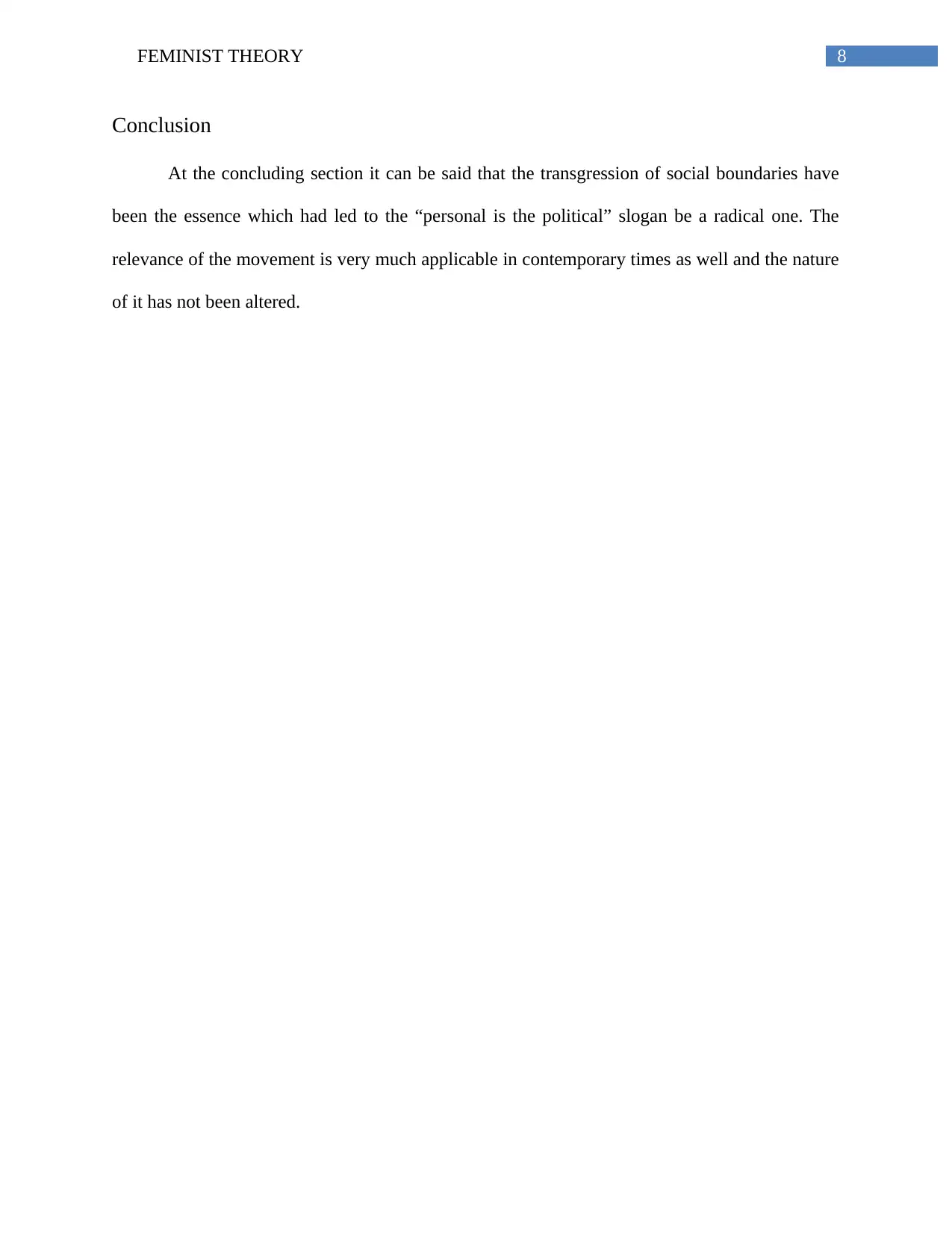
8FEMINIST THEORY
Conclusion
At the concluding section it can be said that the transgression of social boundaries have
been the essence which had led to the “personal is the political” slogan be a radical one. The
relevance of the movement is very much applicable in contemporary times as well and the nature
of it has not been altered.
Conclusion
At the concluding section it can be said that the transgression of social boundaries have
been the essence which had led to the “personal is the political” slogan be a radical one. The
relevance of the movement is very much applicable in contemporary times as well and the nature
of it has not been altered.
⊘ This is a preview!⊘
Do you want full access?
Subscribe today to unlock all pages.

Trusted by 1+ million students worldwide
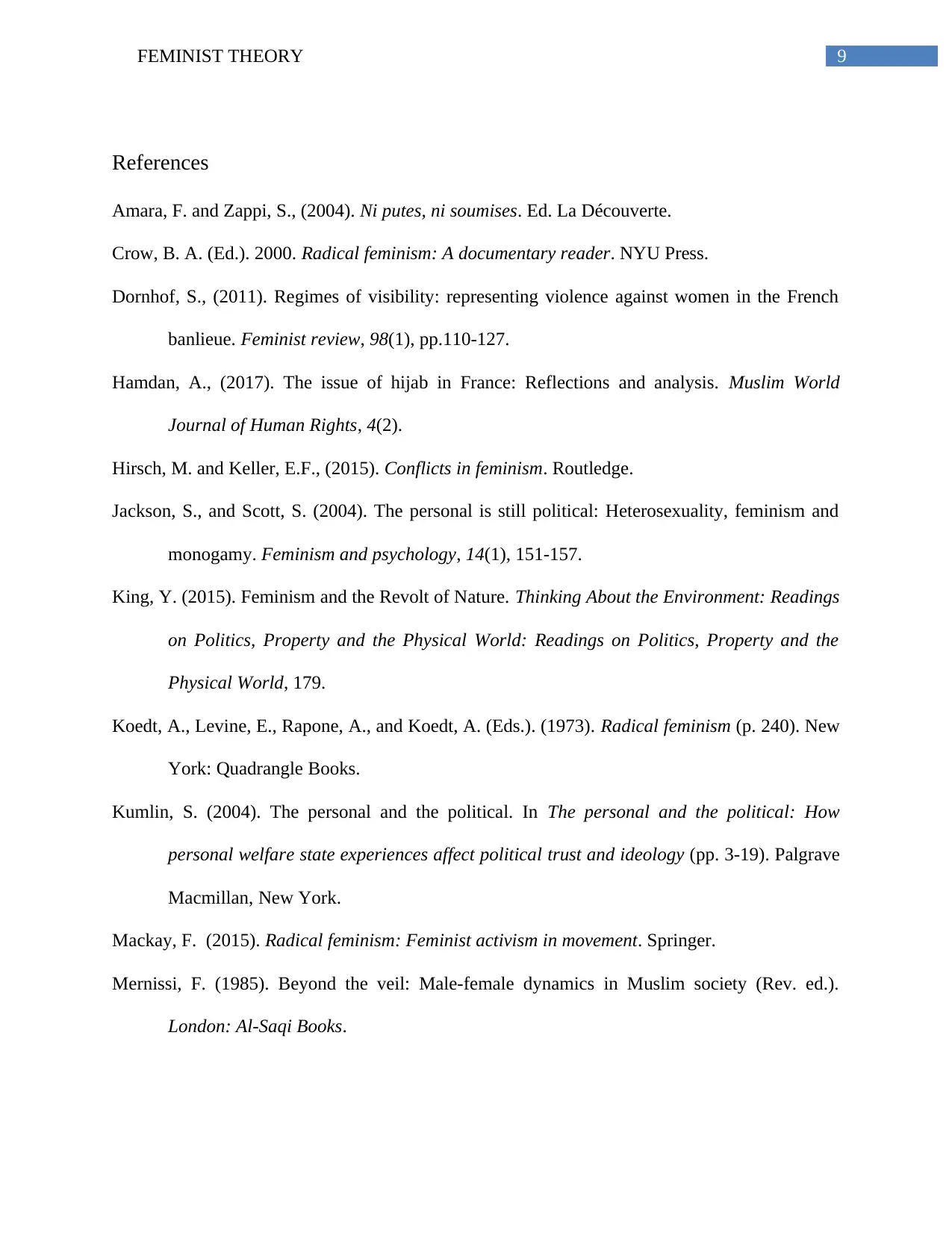
9FEMINIST THEORY
References
Amara, F. and Zappi, S., (2004). Ni putes, ni soumises. Ed. La Découverte.
Crow, B. A. (Ed.). 2000. Radical feminism: A documentary reader. NYU Press.
Dornhof, S., (2011). Regimes of visibility: representing violence against women in the French
banlieue. Feminist review, 98(1), pp.110-127.
Hamdan, A., (2017). The issue of hijab in France: Reflections and analysis. Muslim World
Journal of Human Rights, 4(2).
Hirsch, M. and Keller, E.F., (2015). Conflicts in feminism. Routledge.
Jackson, S., and Scott, S. (2004). The personal is still political: Heterosexuality, feminism and
monogamy. Feminism and psychology, 14(1), 151-157.
King, Y. (2015). Feminism and the Revolt of Nature. Thinking About the Environment: Readings
on Politics, Property and the Physical World: Readings on Politics, Property and the
Physical World, 179.
Koedt, A., Levine, E., Rapone, A., and Koedt, A. (Eds.). (1973). Radical feminism (p. 240). New
York: Quadrangle Books.
Kumlin, S. (2004). The personal and the political. In The personal and the political: How
personal welfare state experiences affect political trust and ideology (pp. 3-19). Palgrave
Macmillan, New York.
Mackay, F. (2015). Radical feminism: Feminist activism in movement. Springer.
Mernissi, F. (1985). Beyond the veil: Male-female dynamics in Muslim society (Rev. ed.).
London: Al-Saqi Books.
References
Amara, F. and Zappi, S., (2004). Ni putes, ni soumises. Ed. La Découverte.
Crow, B. A. (Ed.). 2000. Radical feminism: A documentary reader. NYU Press.
Dornhof, S., (2011). Regimes of visibility: representing violence against women in the French
banlieue. Feminist review, 98(1), pp.110-127.
Hamdan, A., (2017). The issue of hijab in France: Reflections and analysis. Muslim World
Journal of Human Rights, 4(2).
Hirsch, M. and Keller, E.F., (2015). Conflicts in feminism. Routledge.
Jackson, S., and Scott, S. (2004). The personal is still political: Heterosexuality, feminism and
monogamy. Feminism and psychology, 14(1), 151-157.
King, Y. (2015). Feminism and the Revolt of Nature. Thinking About the Environment: Readings
on Politics, Property and the Physical World: Readings on Politics, Property and the
Physical World, 179.
Koedt, A., Levine, E., Rapone, A., and Koedt, A. (Eds.). (1973). Radical feminism (p. 240). New
York: Quadrangle Books.
Kumlin, S. (2004). The personal and the political. In The personal and the political: How
personal welfare state experiences affect political trust and ideology (pp. 3-19). Palgrave
Macmillan, New York.
Mackay, F. (2015). Radical feminism: Feminist activism in movement. Springer.
Mernissi, F. (1985). Beyond the veil: Male-female dynamics in Muslim society (Rev. ed.).
London: Al-Saqi Books.
Paraphrase This Document
Need a fresh take? Get an instant paraphrase of this document with our AI Paraphraser

10FEMINIST THEORY
Selby, J.A., (2011). French secularism as a ‘guarantor’of women's rights? Muslim women and
gender politics in a Parisian banlieue. Culture and Religion, 12(4), pp.441-462.
Selby, J.A., (2011). French secularism as a ‘guarantor’of women's rights? Muslim women and
gender politics in a Parisian banlieue. Culture and Religion, 12(4), pp.441-462.
1 out of 11
Your All-in-One AI-Powered Toolkit for Academic Success.
+13062052269
info@desklib.com
Available 24*7 on WhatsApp / Email
![[object Object]](/_next/static/media/star-bottom.7253800d.svg)
Unlock your academic potential
Copyright © 2020–2026 A2Z Services. All Rights Reserved. Developed and managed by ZUCOL.

